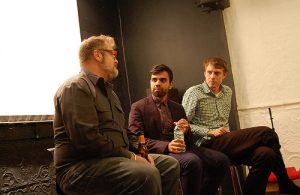An Intimate Look at Pakistan’s Humanity
 tories evoke emotions. They help us cultivate a relationship and develop a sense of familiarity. By revealing personal vulnerabilities and universal longings, stories help us relate to one another, across faith and geography and beyond generalizations or stereotypes, simply as human beings. This is what makes “These Birds Walk”, a new film by first-time filmmakers Omar Mullick and Bassam Tariq, all the more poignant. Not only is it a beautiful work of cinematography, it is also a profoundly moving story that provides a glimpse into the daily, messy, complex lives of people in Pakistan, a country rarely seen through its human reality.
tories evoke emotions. They help us cultivate a relationship and develop a sense of familiarity. By revealing personal vulnerabilities and universal longings, stories help us relate to one another, across faith and geography and beyond generalizations or stereotypes, simply as human beings. This is what makes “These Birds Walk”, a new film by first-time filmmakers Omar Mullick and Bassam Tariq, all the more poignant. Not only is it a beautiful work of cinematography, it is also a profoundly moving story that provides a glimpse into the daily, messy, complex lives of people in Pakistan, a country rarely seen through its human reality.
Initially, Mullick and Tariq set out to make a film about Abdul Sattar Edhi, arguably the most respected and admired person in Pakistan. An octagenarian humanitarian with a white flowing beard, Edhi has been caring for Pakistan’s desperate young and old for the past 60 years through his vast network of orphanages, shelters, clinics and ambulance services. He’s introduced to the audience in the film’s opening scene. We meet Edhi sitting on a stool bathing a scrawny child in a small plastic washbasin. He doesn’t want a film made about him, he tells the directors. “If you want to find me, you will find me among the people. My story is there.”
Mullick and Tariq take their cue. They set much of their film in one of Edhi’s shelters, a “safe haven for unknown and abandoned children” in Karachi. There they meet Omar, a 9 year-old Pashtun boy who has run away from home, most likely due to abuse. He’s charismatic and brash, toughened by his father’s blows, yet sensitive to the desire for home, and longing to belong. Omar spends his days with the other boys at the shelter, fighting, playing, praying, singing, crying, and talking about God and their destiny.
At an ambulance dispatch center near Edhi’s office, we meet the film’s second main character, Asad, a former street kid now in his 20s who drives an Edhi ambulance, retrieving dead bodies and returning runaway children to their families. He grew up without parents; time and circumstance have been his teachers, he says. He used to drive the streets night after night, depressed and hoping to die, when he saw a ‘help wanted’ sign at Edhi’s center. He needed help, he wanted to help. “It made me feel better. It helped distance my pain.” The film alternates between Omar and Asad’s stories and their interaction; the scenes that unfold are raw, visceral and hauntingly unforgettable.

Filmmaker, Bassam Tariq (center), at a showing of “These Birds Walk.”
Photo courtesy of UnionDocs/Flickr.
In one, Omar recounts how his father beats him, revealing his wounds, but defiantly claiming that he only ever allows one single tear to fall. “If any more drop, I’m not a man’s man.” In another scene, Asad is driving Omar back home when Omar insists that he take him first to a shrine so he can pray. Omar escapes from the ambulance and runs towards the shrine resisting anyone who gets in his way. The chase scene is fast and frenetic, ending with Omar in a chaotic crowd of adults praying his heart out. “In this country, everyone is running after a prayer,” Asad says.
The scene that still haunts me takes place one night at the shelter. Omar is lying on the ground, flickering candles illuminating his face. He speaks to God in a hushed whisper confessing how much he misses falling asleep with his brothers and sisters, asking God, “What do you want me to do? Should I kill myself? Dear God, tell me what to do?”
Mullick and Tariq could have made a film about Edhi’s impact, letting a wider audience know about his extraordinary life and commitment, a point of immense pride for all Pakistanis. They could have shown stories of triumph and happier endings, to counter the onslaught of negative images of terror and strife coming out of Pakistan. Instead, they chose to reveal life as it is lived by so many in Pakistan, uncensored, unapologetic, and uncompromisingly real. We are given an opportunity to live amongst these boys and jostle for our own power position, to ride in the ambulance and fear our next destination, to pray by candlelight and whisper our own insecurities. After all, it is through these shared intimate experiences that empathy and real understanding can have a chance to develop.
Omar and Asad’s individual stories may be tragic, but this is not a tragic story. It is one of resilience and survival. Of birds defying the strictures of their cages. These birds walk.
Featured image courtesy of the Little Rock Film Festival.






